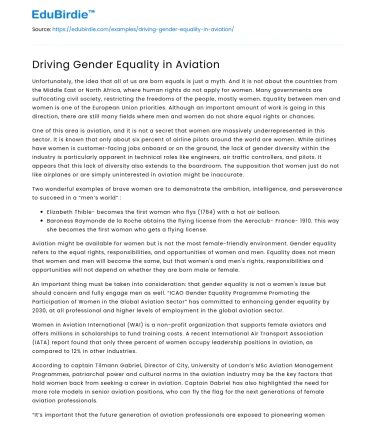Unfortunately, the idea that all of us are born equals is just a myth. And it is not about the countries from the Middle East or North Africa, where human rights do not apply for women. Many governments are suffocating civil society, restricting the freedoms of the people, mostly women. Equality between men and women is one of the European Union priorities. Although an important amount of work is going in this direction, there are still many fields where men and women do not share equal rights or chances.
One of this area is aviation, and it is not a secret that women are massively underrepresented in this sector. It is known that only about six percent of airline pilots around the world are women. While airlines have women is customer-facing jobs onboard or on the ground, the lack of gender diversity within the industry is particularly apparent in technical roles like engineers, air traffic controllers, and pilots. It appears that this lack of diversity also extends to the boardroom. The supposition that women just do not like airplanes or are simply uninterested in aviation might be inaccurate.
Two wonderful examples of brave women are to demonstrate the ambition, intelligence, and perseverance to succeed in a “men’s world” :
- Elizabeth Thible- becomes the first woman who flys (1784) with a hot air balloon.
- Baroness Raymonde de la Roche obtains the flying license from the Aeroclub- France- 1910. This way she becomes the first woman who gets a flying license.
Aviation might be available for women but is not the most female-friendly environment. Gender equality refers to the equal rights, responsibilities, and opportunities of women and men. Equality does not mean that women and men will become the same, but that women's and men's rights, responsibilities and opportunities will not depend on whether they are born male or female.
An important thing must be taken into consideration: that gender equality is not a women's issue but should concern and fully engage men as well. “ICAO Gender Equality Programme Promoting the Participation of Women in the Global Aviation Sector” has committed to enhancing gender equality by 2030, at all professional and higher levels of employment in the global aviation sector.
Women in Aviation International (WAI) is a non-profit organization that supports female aviators and offers millions in scholarships to fund training costs. A recent International Air Transport Association (IATA) report found that only three percent of women occupy leadership positions in aviation, as compared to 12% in other industries.
According to captain Tilmann Gabriel, Director of City, University of London’s MSc Aviation Management Programmes, patriarchal power and cultural norms in the aviation industry may be the key factors that hold women back from seeking a career in aviation. Captain Gabriel has also highlighted the need for more role models in senior aviation positions, who can fly the flag for the next generations of female aviation professionals.
“It’s important that the future generation of aviation professionals are exposed to pioneering women such as SHAESTA WAIZ, the Afghan aviator who flew solo around the world, and Captain Tammie Jo Shults who flawlessly handled the emergency landing of a Southwest Airline plane in Philadelphia. This role models should be promoted to show young women that a high-flying career in aviation is certainly achievable.”
Because the aviation industry and global transport are rapidly expanding, there is a pressing need to guarantee the current and future availability of aviation personnel required to ensure a safe, efficient, secure, economically sustainable and environmentally responsible civil aviation sector. Relevant opportunities need to be created. It is important to offer flexible work opportunities for young mothers, who are balancing careers with raising a family.
At the European level, the women work 70 minutes to earn what a man can earn in 60 minutes or, for every 100E that a man earns, a woman receives only 86E. The conclusion is that a woman earns, in general, with 16,4% less than a man. Regarding the aviation industry, but not only 'supporting the development and training of female professionals, the industry will attract broader interest and gain a diverse candidate base, thus allowing the industry to thrive.'.
Every employer wants a candidate who can not only do the job as per the job description but who will go above and beyond and put 110% effort at all times. A combination of skills is needed to be a successful employee, especially in the aviation industry. Cheerful, energetic and positive candidates are needed, with a 'can-do' attitude and the ability to work as part of a team. Also, good communication skills are required.
References
- Kearns, S.K. (2018) Fundamentals of International Aviation. Abingdon: Routledge
- International Airport Review (2010) Five times the aviation industry championed gender equality in 2018. Available at: https://www.internationalairportreview.com/news/82492/five-times-the-aviation-industry-championed-gender-equality-in-2018/ (Accessed: 10 November 2019)
- Europarl (2019) Equality between men and women. Available at: http://www.europarl.europa.eu/factsheets/en/sheet/59/equality-between-men-and-women (Accessed at: 10 November 2019)
- Avocatoo (2018) Egalitatea intre femei si barbati- un concept sau o realitate?! Available at: https://www.blog.avocatoo.ro/conceptul-egalitatii-intre-sexe/ (Accessed at: 11 November 2019)






 Stuck on your essay?
Stuck on your essay?

